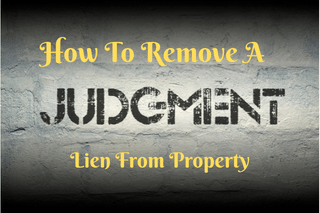Are you a homeowner who is dealing with a judgment lien on your property? If so, you may be wondering how to get rid of it. And in order to clear up any title issues on a piece of property, it is important to remove any liens that may be attached.
A judgment lien is a type of lien that can negatively impact the title of a property and complicate the sale or refinancing process. This blog post will provide you with information on how to remove a judgment lien from your property. Keep reading for more information.
Table of Contents
• Judgment Lien On Personal Property
• Is A Judgement Lien Involuntary
➥How Does A Judgment Lien Work
• How To Remove A Judgement Lien
• Do Judgment Liens Expire
• Judgments Can Be Eliminated
• How To Stop A Judgement
➥ How To Vacate A Judgement
• Can You Sell A House With A Lien
➥Sell Your House To ASAP Cash Offer
Judgment Lien On Personal Property
Judgement Lien is a non-consensual, statutory lien that attaches to all of a debtor’s interests in real and personal property, arising by operation of law when a court enters judgment in favor of a creditor.
A civil judgment is a finding by a court that one party owes another money or damages. When the judgment is for money, it is often called a money judgment or debt judgment. A creditors’ rights attorney can help you understand and determine if you have a valid claim against someone or some entity.
Is A Judgement Lien Involuntary?

A judgment lien is an involuntary lien that is placed on your property without your consent. This type of lien is placed on your property when you owe money to someone and they take you to court to get a judgment against you. If the judge rules in their favor, they will then have the right to place a lien on your property.
If you have a judgment lien on your property, it means that you owe money to someone and they have taken legal action against you.
How Does A Judgment Lien Work?
A judgment lien attaches to all of the debtor’s interests in both real and personal property. The term “interest” includes any present or future rights that the debtor has in the property. This means that the debtor cannot sell, refinance, or borrow against the property without first paying off the judgment lien.
A judgment lien also gives the creditor the right to force a sale of the property in order to get paid. This is called a “forced sale.” The creditor can ask the court to order the sheriff to sell the property and use the proceeds from the sale to pay off the debt.
How To Remove A Judgement Lien From Your House?
In order to remove the judgment lien from your property, you will need to :
1. Take action to pay off the debt that is owed. You can do this by working out a payment plan with the creditor, selling the property, or refinancing the mortgage.
2. If you are unable to pay off the debt, you may file for bankruptcy. This is because bankruptcy will discharge (wipe out) most types of debts, including judgment liens.
3. You may also be able to have the lien removed if you can prove that it is “unjust” or “improper.” This is a difficult process, and you should speak to an attorney if you are considering this option.
4. Finally, you can try to negotiate with the creditor to have the lien removed. You can offer the creditor something in return for removing the lien (such as a lump sum payment).
If you are dealing with a judgment lien on your property, it is important to take action to remove it. Otherwise, you may have difficulty selling or refinancing your property in the future.
Call Now (818) 651-8166
Why Sell Your Home to ASAP Cash Offer?
- You Pay Zero Fees
- Close quickly 7-28 days.
- Guaranteed Offer, no waiting.
- No repairs required, sell “AS IS”
- No appraisals or delays.
Do Judgment Liens Expire?
In some states, judgment liens expire after a certain period of time. This is typically 10 years, but it can vary from state to state.
If you are dealing with a judgment lien, you will need to take action to remove the lien before you can sell or refinance your property.
In Title Search Judgments Can Be Eliminated
If you are in the process of selling your home or refinancing your mortgage, a title search will be conducted. This is to ensure that there are no outstanding liens or judgments against the property. If a judgment lien is found, it will need to be paid off before the sale or refinance can go through.
Alternatively, you may be able to have the lien removed if you can prove that it is unjust or improper. A title search is a thorough examination of public records to determine the ownership of real property and any claims against it. The title search will reveal any outstanding judgments against the property owner.
How To Stop A Judgement?
If you have been served with papers notifying you that a judgment has been entered against you, it is important to take action immediately. If you do nothing, the creditor can start taking steps to collect on the debt, including wage garnishment and asset seizure.
You can stop a judgment by :
- Filing for bankruptcy. This will automatically stop all collection activity, including judgments.
- Asking the court to vacate (cancel) the judgment. This may be an option if you were never properly served with notice of the lawsuit.
- Negotiating with the creditor to have the debt discharged (wiped out). This is typically only an option if you can prove that you do not have the ability to pay the debt.
- Paying off the debt in full. This will stop all collection activity, including judgments.
How To Vacate A Judgement?
You may be able to have a judgment vacated if :
- You were never properly served with notice of the lawsuit, or
- There was some other error in the case.
- You can show that you do not have the ability to pay the debt.
- The statute of limitations has expired.
Can You Sell A House With A Lien Against It?
If you have a lien against your property, you may still be able to sell it. However, the lien will need to be paid off at closing. The proceeds from the sale will go to pay off the outstanding debt, and any remaining funds will be given to the property owner.
If you are considering selling your property, you should speak to an attorney to find out if there are any liens or judgments against the property.

Why Should You Sell Your House To ASAP CASH Offer?
ASAP CASH Offer is cash buyers that buy houses as-is. If you’re trying to sell your home fast, we can close between 7-28 days. Selling your house to us will eliminate the hassle of having to list your home, show it to buyers, and hope that you find a qualified buyer that can close on your timeline. We will cover the closing cost and there are never any realtor fees.
If you’re interested in learning more about how we can help you sell your house fast, give us a call at 8054278312.

